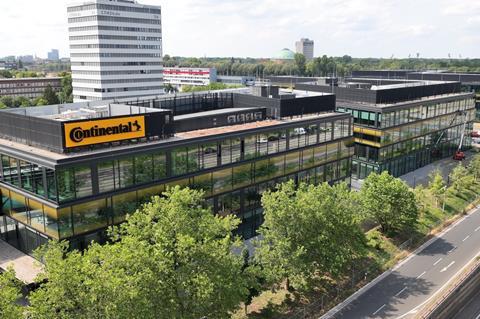Continental is spinning off its Automotive business unit and selling the Original Equipment Solutions (OESL) business of ContiTech as it looks for greater flexibility in responding to automotive market trends
Continental will spin off its Automotive business into a separate European company by the end of 2025, operating under a new brand to be launched in April. The spin-off company will be led by Philipp von Hirschheydt, who has been in charge of the Automotive group sector since May 2023.

By establishing the business as a separate company Continental hopes to “unlock new strengths”, according to Wolfgang Reitzle, chairman of the supplier’s chairman of the Supervisory Board. He that said focused companies are more agile in times of transformation and the move had the support of the entire board.
“Our entire team is highly motivated and focused on preparing for the spin-off,” added Hirschheydt. “Short and mid-term targets for Automotive as an independent company will be disclosed at Automotive’s Capital Market Day.” Continental said that is scheduled to take place in summer 2025.
Continental’s Industry Technology Solutions business (ContiTech) is also looking to sell its Original Equipment Solutions (OESL) business, which supplies rubber products to automotive manufacturers. The sale process is due to begin in the first quarter of 2025.
According to Continental’s CEO, Nikolai Selzer, the company is looking for greater independence for its profitable Tires and ContiTech group sectors. He said that central to that plan is the gradual transfer of group-level services and functions to the group sectors. “The goal is to create a lean, focused holding structure by the end of 2025,” said Selzer. “Corporate responsibility will increasingly lie where it delivers the greatest value – in the group sectors, close to markets and customers. Our new structure will let us respond more flexibly to customer and market developments, enabling us to maximise our opportunities.”
Olaf Schick has announced he will step down from his role at Continental as executive board member for finance, integrity and law, effective September 30, 2025 and move to Mercedes-Benz Group.
Spin-offs and mergers
Tier one suppliers are looking at a range of strategies to stay competitive, focus operations and invest to keep profitable as the industry shifts in technology, most notably to electrified powertrains. That requires huge investment and capital outlay in product development, as well in operations, including re-tooling plants and adapting facilities.
In 2023 Borgwarner turned its Fuel Systems and Aftermarket segments into a separate, publicly traded company named Phinia. That followed the sale of its North American controls business, which its president and CEO Frédéric Lissalde said at the time was allowed Borgwarner and Phinia to respectively focus on their own strategies. As part of its Charging Forward 2027 strategy Borgwarner said it aims to achieve more than $10 billion in revenue from parts for electric vehicles.
Strategic collaboration has also been a strategy supporting focus on eproducts at Borgwarner, as seen in early 2024 when it signed an agreement with FinDreams Battery, a subsidiary of BYD, to localise LFP battery packs for commercial vehicles in Europe. In an interview with sister publication Automotive Manufacturing Solutions in October BorgWarner’s executive vice president and chief strategy officer, Paul Farrell notes how this progress as a supplier to the electric vehicle market is supported by important mergers and acquisitions (M&A).
A good example of M&A as a strategy came in October this year when Vitesco Technologies Group became part of Schaeffler. The combined company has consolidated annual sales of around €25 billion and has more than 100 production facilities worldwide. Schaeffler Group is dividing its business activities into four focused divisions: E-Mobility, Powertrain and Chassis, Vehicle Lifetime Solutions, and Bearings and Industrial Solutions.
Tier one suppliers also need to use technology to more closely integrate their supply chains. In a recent interview with Automotive Logistics, Agnieszka Kubiak, senior vice-president of logistics at Brose Group, said the automotive sector is in a transition period and that is fraught with a lack of financial and digital resources across various functions.
The lack of comprehensive, real-time visibility across the supply chain is a prevalent problem. Kubiak says that managing inefficiencies and delays more effectively relies on closer and more consistent analysis across supply chain functions supported by technology.
“We navigate complex supply chains in a constantly changing environment influenced by geopolitical, economic and natural events that disrupt the entire system,” she said. Added to which, within the system there are gaps in end-to-end information, insufficient data quality and integrity, missing compatibility and fragmented data flows.

























![Global[1]](https://d3n5uof8vony13.cloudfront.net/Pictures/web/a/d/s/global1_726550.svgz)













No comments yet